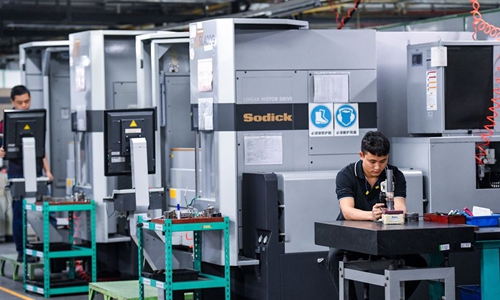Foxconn furloughs workers as orders from abroad shrink
By Yin Yeping and Li Xuanmin Source:Global Times Published: 2020/4/28 20:27:24

Workers are seen at a workshop in Longhua science and technology park of Foxconn Technology Group in Shenzhen, south China's Guangdong Province, Feb 22, 2019. (Xinhua/Mao Siqian)
Although the coronavirus has been largely contained in China, it is still spreading overseas, and that's causing a drop in export orders, leaving many workers in China's contract factories facing layoffs, pay cuts and furloughs.However, Chinese workers and experts believe that this is a short-term predicament that will pass with the implementation of relevant government policies.
In recent days, many Foxconn employees have reported online that the company has furloughed them for four months to look for new jobs, because its orders are draining.
Other contract manufacturers such as Salcomp reported layoffs of more than 1,000 people, raising questions over whether it signals a rise in unemployment in the manufacturing sector.
A worker at Foxconn's factory in Shenzhen city who declined to be identified told the Global Times on Tuesday that the company offered a four-month furlough for workers starting April 23.
"There are some departments like the one for making iPhones where workers are told to take a holiday because there are hardly any orders from abroad," he said. However, he said that it is a good thing. Instead of doing nothing at the factory, workers can seek jobs elsewhere, and they can always come back in September. Job cuts are normal in every country, he said.
"If you are satisfied being an ordinary worker in Foxconn, then you don't expect much because you can't afford a car or a house," he said, adding that he is also working as a job recruiter to make more money by helping others find jobs.
Recently, an online user who identified himself as Xiao Guang claimed to be an employee of Foxconn. He said in a video online that the workers never thought such a big factory would have a holiday.
"But this year, some workers will have to take four months off," he said. The holiday runs from April 27 to August 31. He said that the holiday is mainly for employees who joined the factory this year. Recently, Xiao joined an online group where he can find hourly work at the weekend.
A spokesperson of Foxconn told the Global Times on Tuesday that the company is looking into the situation.
The employment pressure is real, both for those who are unemployed and those who are not.
A worker who was dismissed from Taiwan-based assembler Pegatron Corp, another Apple iPhone supplier, told the Global Times that many of the temporary workers hired this year had their contracts terminated and were not paid as much as they had been promised, causing widespread discontent.
"It was supposed to be three months. Regular workers are on a five-day shift, eight hours a day. We all have to do more work for more money, so it's hard to make more money without working overtime," he said, noting that jobs are hard to find.
Zhang Ying, director of the employment promotion department of the Ministry of Human Resources and Social Security, told a press briefing on April 21 that the surveyed urban unemployment rate in March was 5.9 percent, and the employment situation was worse than in previous years.
Industry experts said that the situation will ease in June as government support policies are in place.
Li Changan, a professor at the University of International Business and Economics' School of Public Administration, told the Global Times on Tuesday that what happened at Foxconn is not unique. Many companies in China are taking similar contingency measures.
"The government has put forward a series of safeguard measures, and it also issued corresponding policies for the affected enterprises to stabilize growth, including tax cuts and refunds for industrial insurance," Li said.
The employment situation will ease in June with support measures such as policies that encourage migrant workers to return to their hometowns and start businesses, and subsidies for companies that do not fire workers, Li said.
Liang Zhenpeng, an industry analyst, told the Global Times that given the long supply chain of Apple, for manufacturing companies like Foxconn to return to normal also depends on the pandemic control in the US and European countries
Apple's market is leaning toward the West as its market share in China is shrinking due to its own dropping competitiveness, Liang said.
Apple did not respond to a request for comment as of press time.
RELATED ARTICLES: